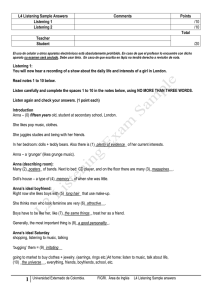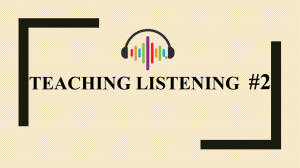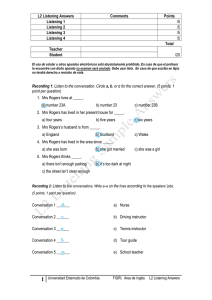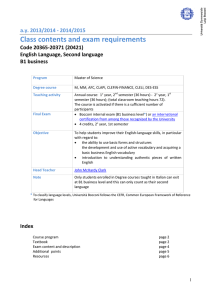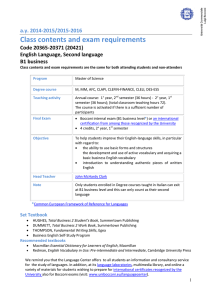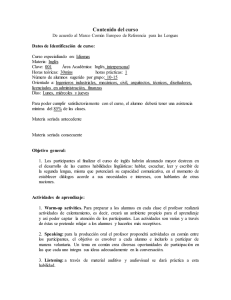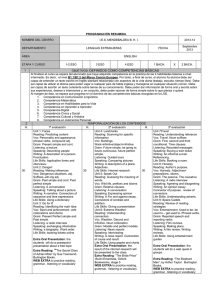English Result Upper-intermediate Student`s Book
Anuncio
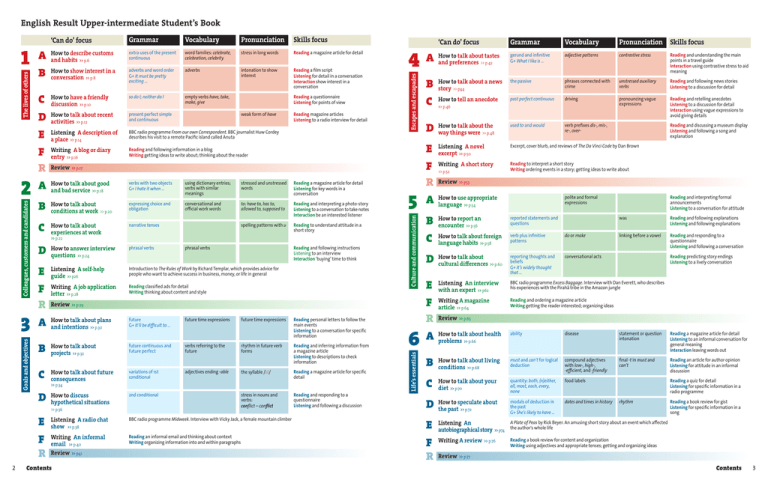
English Result Upper-intermediate Student’s Book Goals and objectives 3 Pronunciation Skills focus A How to describe customs and habits >> p.6 extra uses of the present continuous word families: celebrate, celebration, celebrity stress in long words Reading a magazine article for detail B How to show interest in a conversation >> p.8 adverbs and word order G+ It must be pretty exciting … adverbs intonation to show interest Reading a film script Listening for detail in a conversation Interaction show interest in a conversation C How to have a friendly discussion >> p.10 so do I; neither do I empty verbs have, take, make, give D How to talk about recent activities >> p.12 present perfect simple and continuous E Listening A description of a place >> p.14 BBC radio programme From our own Correspondent. BBC journalist Huw Cordey describes his visit to a remote Pacific island called Anuta F R Writing A blog or diary entry >> p.16 Reading and following information in a blog Writing getting ideas to write about; thinking about the reader A How to talk about good and bad service >> p.18 verbs with two objects G+ I hate it when … using dictionary entries; verbs with similar meanings stressed and unstressed words Reading a magazine article for detail Listening for key words in a conversation B How to talk about conditions at work >> p.20 expressing choice and obligation conversational and official work words to: have to, has to, allowed to, supposed to Reading and interpreting a photo-story Listening to a conversation to take notes Interaction be an interested listener C How to talk about experiences at work narrative tenses spelling patterns with u Reading to understand attitude in a short story D How to answer interview questions >> p.24 phrasal verbs E Listening A self-help guide >> p26 Introduction to The Rules of Work by Richard Templar, which provides advice for people who want to achieve success in business, money, or life in general F R Writing A job application letter >> p.28 Reading classified ads for detail Writing thinking about content and style A How to talk about plans and intentions >> p.30 future G+ It’ll be difficult to … How to talk about projects >> p.32 future continuous and future perfect How to talk about future consequences variations of 1st conditional How to discuss hypothetical situations 2nd conditional weak form of have Reading magazine articles Listening to a radio interview for detail Review >> p.17 >> p.22 B C phrasal verbs Reading and following instructions Listening to an interview Interaction ‘buying’ time to think future time expressions verbs referring to the future adjectives ending -able future time expressions rhythm in future verb forms the syllable /@l/ Reading personal letters to follow the main events Listening to a conversation for specific information Reading and inferring information from a magazine article Listening to descriptions to check information Reading a magazine article for specific detail >> p.34 D 5 Review >> p.29 >> p.36 2 Reading a questionnaire Listening for points of view 4 Escapes and escapades Vocabulary Culture and communication Colleagues, customers and candidates 2 Grammar stress in nouns and verbs: conflict – conflict Reading and responding to a questionnaire Listening and following a discussion 6 Life’s essentials The lives of others 1 ‘Can do’ focus ‘Can do’ focus Grammar Vocabulary Pronunciation Skills focus A How to talk about tastes and preferences >> p.42 gerund and infinitive G+ What I like is … adjective patterns contrastive stress Reading and understanding the main points in a travel guide Interaction using contrastive stress to aid meaning B How to talk about a news story >> p44 the passive phrases connected with crime unstressed auxiliary verbs Reading and following news stories Listening to a discussion for detail C How to tell an anecdote past perfect continuous driving pronouncing vague expressions Reading and retelling anecdotes Listening to a discussion for detail Interaction using vague expressions to avoid giving details D How to talk about the way things were >> p.48 used to and would verb prefixes dis-, mis-, re-, over- E Listening A novel excerpt >> p.50 Excerpt, cover blurb, and reviews of The Da Vinci Code by Dan Brown F R Writing A short story Reading to interpret a short story Writing ordering events in a story; getting ideas to write about A How to use appropriate language >> p.54 B How to report an encounter >> p.56 reported statements and questions C How to talk about foreign language habits >> p.58 verb plus infinitive patterns do or make D How to talk about cultural differences >> p.60 reporting thoughts and beliefs G+ It’s widely thought that … conversational acts E Listening An interview with an expert >> p62 BBC radio programme Excess Baggage. Interview with Dan Everett, who describes his experiences with the Pirahã tribe in the Amazon jungle F R Writing A magazine article >> p.64 Reading and ordering a magazine article Writing getting the reader interested; organizing ideas A How to talk about health problems >> p.66 ability disease statement or question intonation Reading a magazine article for detail Listening to an informal conversation for general meaning Interaction leaving words out B How to talk about living conditions >> p.68 must and can’t for logical deduction compound adjectives with low-, high-, -efficient, and -friendly final -t in must and can’t Reading an article for author opinion Listening for attitude in an informal discussion C How to talk about your diet >> p.70 quantity: both, (n)either, all, most, each, every, none food labels D How to speculate about the past >> p.72 modals of deduction in the past G+ She’s likely to have … dates and times in history >> p.46 >> p.52 Reading and discussing a museum display Listening and following a song and explanation Review >> p53 polite and formal expressions Reading and interpreting formal announcements Listening to a conversation for attitude was Reading and following explanations Listening and following explanations linking before a vowel Reading and responding to a questionnaire Listening and following a conversation Reading predicting story endings Listening to a lively conversation Review >> p.65 Reading a quiz for detail Listening for specific information in a radio programme rhythm E Listening A radio chat show >> p.38 BBC radio programme Midweek. Interview with Vicky Jack, a female mountain climber Writing An informal email >> p.40 Review >> p41 Reading an informal email and thinking about context Writing o rganizing information into and within paragraphs Listening An autobiographical story >> p74 A Plate of Peas by Rick Beyer. An amusing short story about an event which affected the author's whole life F R E F R Writing A review >> p.76 Reading a book review for content and organization Writing u sing adjectives and appropriate tenses; getting and organizing ideas Contents Reading a book review for gist Listening for specific information in a song Review >> p.77 Contents 3 English Result Upper-intermediate Student’s Book Grammar Vocabulary Pronunciation Skills focus A How to describe remarkable places >> p.78 ways of comparing G+ There can be few … adjective prefixes un-, im- and in- stress for emphasis Reading for detail in a magazine article B How to talk about your attitude to travel >> p.80 be used to doing or used to do attitude adjective stress for contrast Reading and responding to a questionnaire C How to describe maps and diagrams >> p.82 the, a, an or no article describing maps and diagrams D How to talk about changes >> p.84 time adverbs E Listening An interview with a celebrity >> p86 BBC radio programme The Interview. Actor, comedian, and traveller Michael Palin talks about his travels F R Writing A report >> p.88 Reading analysing instructions for a report Writing planning and writing collaboratively; using peer correction to edit writing B climate problems Reading an article to identify cause and effect Listening for detail in a radio programme Review >> p.89 How to give detailed descriptions >> p.90 adjective order toiletries; colours How to talk about your attitude to appearance to have / get something done clothes and appearance stress-timed rhythm Reading a magazine article for general meaning Listening to a conversation for detail Interaction using ‘fillers’ >> p.92 D How to express attitudes and opinions >> p.96 participle clauses G+ I feel sad when they … E Listening A news report >> p.98 A factual popular-science news report from the Daily Telegraph newspaper about uncovering a hidden Van Gogh painting F Writing A letter of complaint >> p100 Reading a letter of complaint and thinking about context Writing thinking about organization and style; connecting ideas with however, furthermore, therefore, because, since How to present an argument >> p.114 tag questions uses of get intonation in tag questions Reading a magazine article and comment¬s for points of view Listening for points of view in a discussion Interaction using ‘well’ to introduce a disagreement B How to talk about problems and solutions should, should have, ought to, had better G+ The idea of going … ough Reading a story for gist and inference Listening for main points and detail in phone calls injury and treatment Reading and responding to a quiz Listening to a conversation for detail >> p.116 C How to talk about medical treatment >> p.118 D How to talk about cause and consequence >> p.120 so / such… that E Listening A humaninterest news story >> p.122 Two newspaper articles about the same human-interest story F R Writing An opinion composition >> p.124 Reading following an argument Writing thinking about paragraph organization; getting ideas to write about Pairwork injury and treatment Review >> p.125 Skills strategies >> p.126–133 Grammar Bank Grammar Plus Irregular verbs >> p.148 Choose a series that delivers results Available now Intermediate Pre-intermediate Elementary Coming in 2010 Upper-intermediate English – How to lessons provide a clear focus and practical language outcomes – Two-page lessons use a whole page of visuals to keep motivation high – ��st-century syllabus includes spoken production and spoken interaction – I can tickline in every lesson encourages immediate self-assessment English English Available now Advanced Upper-intermediate Intermediate Pre-intermediate Elementary Mark Hancock & Annie McDonald multi-media English Student’s MultiROM with the English Result Workbook provides interactive listening, pronunciation, and vocabulary practice Teacher’s DVD with the English Result Teacher’s Book shows English Result in action in the classroom, plus author commentary English Result Student’s website for more practice: Pre-intermediate Student’s Book English Result belongs to the Result super-series – three individual MarkBusiness Hancock &and Annie McDonald series with common Result values: English Result, Result, Exams Result. -ever; whatever, whenever etc personality adjectives stress in long words Reading and responding to a questionnaire Listening to a monologue for general meaning B How to talk about surprising events >> p.104 future perfect parts of the body; attitude adverbs stressed and unstressed words Reading and comparing information in magazine articles Listening for detail in a discussion Interaction responding appropriately to a story C How to talk about annoying behaviour wish; if only informal expressions with exaggeration ‘d Reading emails to identify informal expressions Listening to an informal chat Interaction expressing agreement and sympathy Coming in 2010 at every level Reading and understanding a newspaper article real-world documentary clips and authentic ’s DV vox pops nt Listening A personal life story >> p.110 BBC radio programme Letters Home. An immigrant describes her experiences in Britain F R Writing A polite email Reading to interpret a polite email Writing t hinking about register (politeness); planning content and organization Available now CAE FCE Coming in 2010 PET A Super-series of general English, business English, and exam preparation courses For more information on Result go to www.oup.com/elt Elementary WWWOUPCOMELT Pre-intermediate Student’s Book DVD D E >> p.112 For more practice, go to www.oup.com/elt/englishresult >> p.148 www.oup.com/elt/result English Result Intermediate is designed to take a strong A�-level student to B� or B�+ on the Common European Framework of Reference scales. adjectives of feelings >> p.150–159 Coming soon Takes students from how to to can do in every lesson Elementary Student’s Book verbs followed by both gerund and infinitive G+ I astounded to find … Audio scripts >> p.148 >> p.149 Reading a TV guide and article for general meaning Listening to a conversation for points of view Review >> p.101 How to explain people’s actions >> p.108 Pronunciation >> p.148 Dictionary skills >> p.134–143 How to talk about people’s character >> p.102 D Reading a magazine article for gist and attitude Listening to a radio programme for detail Learn the language you need and put it into practice immediately with English Result. >> p.106 4 A 9A intonation in opinion adverbs Reading and interpreting a description Listening for detail in a description Interaction asking questions for clarification Pronunciation Skills focus English Result iTools multimedia resources for your interactive whiteboard English English Intermediate Student’s Book Upper-intermediate Student’s Book Mark Hancock & Annie McDonald Mark Hancock & Annie McDonald Hancock & McDonald R pronouncing commas Vocabulary Intermediate Student’s Book relative clauses Grammar English C How to say what’s going on in a picture >> p.94 TV words; opinión adverbs Reading adverts for detail Listening to an interview for detail ‘Can do’ focus Stude Image and appearance 8A Satisfaction Reading a magazine article and identifying features on maps Listening and drawing from a description Interaction using strategies to ensure accurate communication 10 Approval The natural world 7 ‘Can do’ focus Intermediate Upper-intermediate Photocopiable Resource Pack communicative resources for every lesson 5C Speaking New ENGLISH FILE Intermediate Work Answer these questions about your country: 1 When you apply for a job, what information do you put in your CV? 2 When you apply for a job, do you need references? (A reference is a description of your work from a previous employer.) • What information do they include? 3 If you have a job, is it easy to get a permanent contract? Or do most people have temporary contracts? 4 Do people work long hours? Do many people do overtime? 5 Is it difficult to get a job without experience? • What jobs can you do without experience? 6 What age do people retire? Do you think this age will change in the future? Work Answer these questions about your country: 1 When you apply for a job, what information do you put in your CV? 2 When you apply for a job, do you need references? (A reference is a description of your work from a previous employer.) • What information do they include? 3 If you have a job, is it easy to get a permanent contract? Or do most people have temporary contracts? 4 Do people work long hours? Do many people do overtime? 5 Is it difficult to get a job without experience? • What jobs can you do without experience? 6 What age do people retire? Do you think this age will change in the future? Photocopiable © Oxford University Press 2007 www.oup.com/elt/englishfile Review >> p.113 Contents Contents 5
